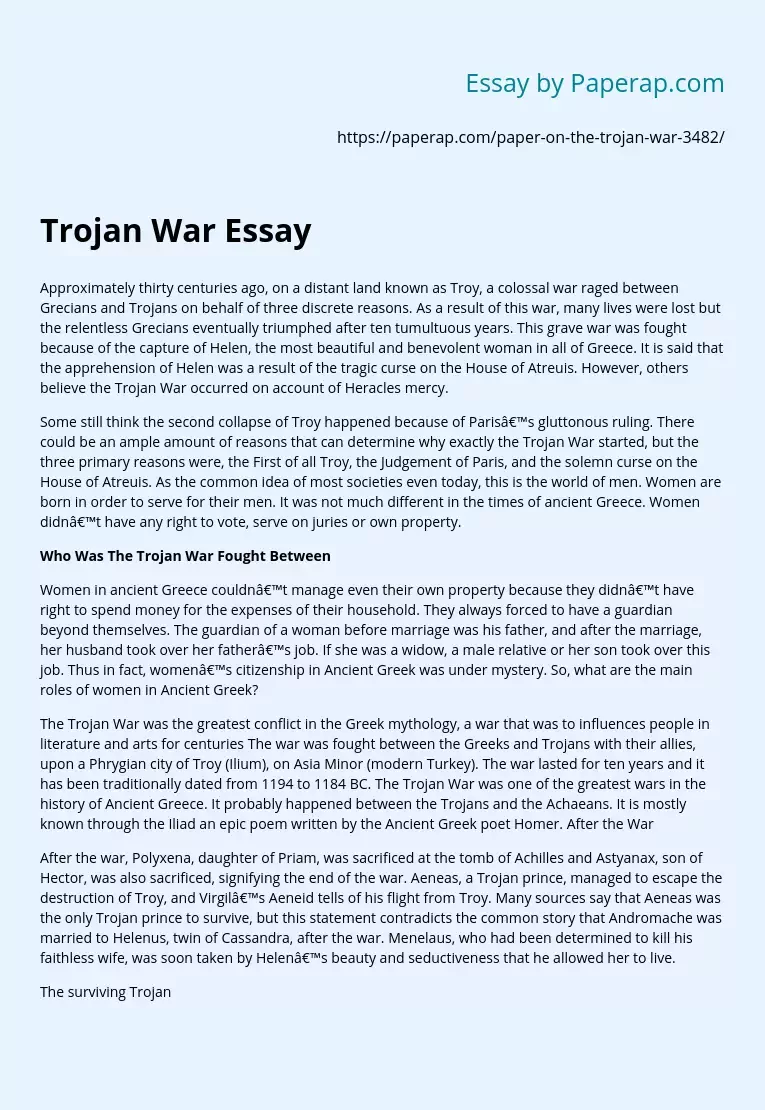Trojan War Essay
Approximately thirty centuries ago, on a distant land known as Troy, a colossal war raged between Grecians and Trojans on behalf of three discrete reasons. As a result of this war, many lives were lost but the relentless Grecians eventually triumphed after ten tumultuous years. This grave war was fought because of the capture of Helen, the most beautiful and benevolent woman in all of Greece. It is said that the apprehension of Helen was a result of the tragic curse on the House of Atreuis.
However, others believe the Trojan War occurred on account of Heracles mercy.
Some still think the second collapse of Troy happened because of Paris’s gluttonous ruling. There could be an ample amount of reasons that can determine why exactly the Trojan War started, but the three primary reasons were, the First of all Troy, the Judgement of Paris, and the solemn curse on the House of Atreuis. As the common idea of most societies even today, this is the world of men.
Women are born in order to serve for their men. It was not much different in the times of ancient Greece. Women didn’t have any right to vote, serve on juries or own property.
Who Was The Trojan War Fought Between
Women in ancient Greece couldn’t manage even their own property because they didn’t have right to spend money for the expenses of their household. They always forced to have a guardian beyond themselves. The guardian of a woman before marriage was his father, and after the marriage, her husband took over her father’s job.
If she was a widow, a male relative or her son took over this job. Thus in fact, women’s citizenship in Ancient Greek was under mystery. So, what are the main roles of women in Ancient Greek?
The Trojan War was the greatest conflict in the Greek mythology, a war that was to influences people in literature and arts for centuries The war was fought between the Greeks and Trojans with their allies, upon a Phrygian city of Troy (Ilium), on Asia Minor (modern Turkey). The war lasted for ten years and it has been traditionally dated from 1194 to 1184 BC. The Trojan War was one of the greatest wars in the history of Ancient Greece. It probably happened between the Trojans and the Achaeans. It is mostly known through the Iliad an epic poem written by the Ancient Greek poet Homer. After the War
After the war, Polyxena, daughter of Priam, was sacrificed at the tomb of Achilles and Astyanax, son of Hector, was also sacrificed, signifying the end of the war. Aeneas, a Trojan prince, managed to escape the destruction of Troy, and Virgil’s Aeneid tells of his flight from Troy. Many sources say that Aeneas was the only Trojan prince to survive, but this statement contradicts the common story that Andromache was married to Helenus, twin of Cassandra, after the war. Menelaus, who had been determined to kill his faithless wife, was soon taken by Helen’s beauty and seductiveness that he allowed her to live.
The surviving Trojan women were divided among the Greek men along with the other plunder. The Greeks then set sail for home, which, for some, proved as difficult and took as much time as the Trojan War itself (e. g. , Odysseus and Menelaus). This is a difficult question to answer for several reasons. First, it is difficult to know when the Trojan war took place. So, there will be considerable debate here. Second, there was a period called the “dark ages” in Greek history where there was limited writing on Greek civilization. Third, the Greek world was broad.
So, it is difficult to make broad statements. For these reasons, it will be difficult to know anything about the role of women for certain. In light of these three points what we have are primarily the works of Homer and what we know of classical Greek culture. Based on this little information we have we can say that women did not have too many rights from a social point of view. They were expected to keep in home and be faithful to the household and family. Penelope, the wife of Odysseus, might be the image of a “perfect” Greek wife.
She was working on the loom and stayed faithful to Odysseus, even though Odysseus was not faithful to her. We see a very similar picture in Athens in the speeches of Lysias. His speeches are important, because there are many incidental details of social life. For example, in his speech on the murder of Eratosthenes, we can see the very domestic life of women. Some scholars even question whether women were allowed at the theater. In short, the life of women before, during, and after the Trojan was was very oppressive compared to modern day. To be sure there are counter examples of strong women, but they were the exception.
Trojan War Essay. (2019, Dec 05). Retrieved from https://paperap.com/paper-on-the-trojan-war-3482/

